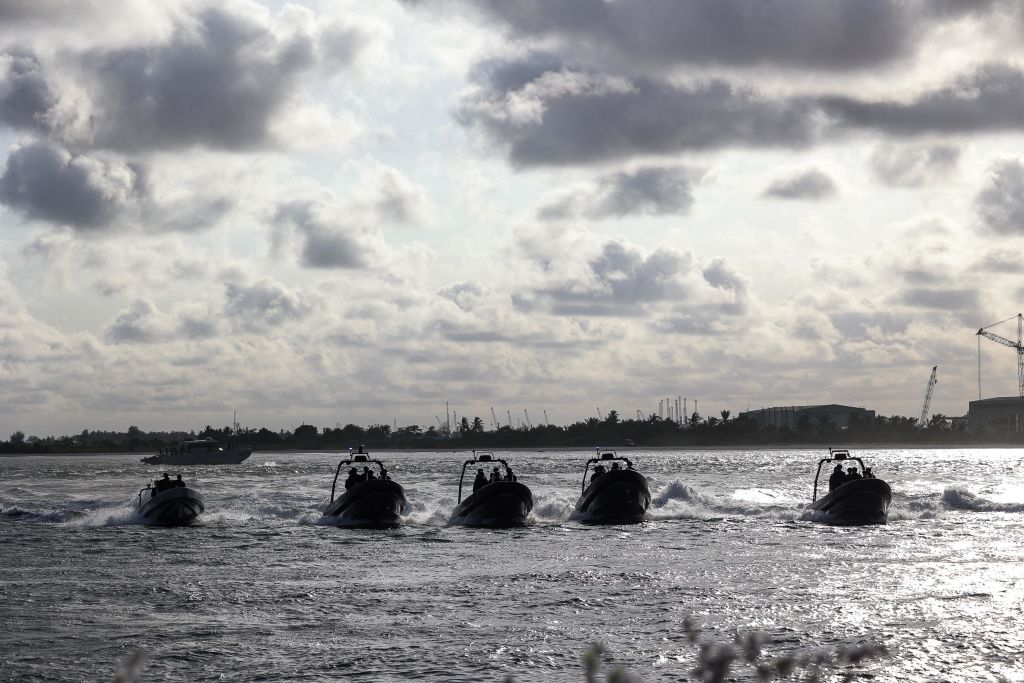As Nigeria faces a range of threats to its coastal and inland waterways, it is building an elite Naval unit to undertake some of the most dangerous and complex operations. These missions include hostage rescue, counterpiracy, and tracking terrorists on water and land.
In August, the Nigerian Navy inducted 33 graduates into the Special Boat Service (SBS). Less than half of those who began the grueling 36-week Basic Operator Capability Course completed it, This Day reported.
“You have demonstrated mental tenacity, physical toughness and a will consistent with special operations forces around the world,” Rear Adm. O.O. Soyemi, flag officer commanding of Special Operations Command, told the graduates. “You have every reason to be proud of yourselves.”
The ceremony included demonstrations of amphibious assault, hostage rescue, rappelling into the water from a helicopter and other skills. Soyemi said the skills and training soon will be put to use and warned the newly minted SBS operators it would not be easy.
“Such moments will call for your selfless service and sacrifices, so you must be prepared,” Soyemi said.
The SBS was created in 2006 in response to attacks on oil installations and kidnapping for ransom in the Niger Delta. The unit was modeled after the British Royal Navy’s Special Boat Service and the U.S. Navy SEALs, and the SBS has trained alongside both services.
The SBS has recorded numerous high-profile successes, including the 2019 rescue of 11 crew members aboard a container ship attacked by pirates in Beninese waters and the 2020 rescue of 18 crew members aboard the MV Hailufang II, which was hijacked in Ivoirian waters. The SBS plays a key role in land-based counterinsurgency operations in the northeast and search and rescue operations on the water.
In 2025, the Nigerian Navy created the Special Operations Command on the North Bank of the River Benue. The newly formed Nigerian Navy Marines will support the command, which will incorporate the SBS and the Deep Blue Maritime Security Unit.
Rear Adm. Eugenio Farreira, chief of operations at Naval Headquarters, said the new command and creation of the Marines are designed to allow the Navy to respond to emerging threats with “greater agility, precision, and adaptability.”
“The new commands are bold statements of intent and a declaration that the Nigerian Navy is determined, prepared, and proactive in confronting complex maritime asymmetric security challenges facing our nation in the 21st century,” Farreira said in June 2025.
SBS training is notoriously difficult and includes extreme endurance tests, physical deprivation and long-range swimming. Specialized courses focus on underwater demolition, combat diving, parachuting, survival training, close quarters combat, weapons handling, and intelligence gathering and analysis. The training culminates with “hell week” in which candidates are pushed to their physical and mental limits.
At the latest graduation, SBS Commander Andrew Zidon said the trainees have “expended thousands of rounds of ammunition and pyrotechnics, burnt thousands of liters of petroleum, oil and lubricant, swam kilometers at sea, and performed countless hours of high-intensity workouts.”
The goal of this arduous training, he said, is to win before ever setting foot on the battlefield.
“They have demonstrated the physical fitness, mental tenacity, psychological readiness and emotional toughness required to carry out duties that will be assigned to them by the Nigerian Navy,” Zidon told This Day.

